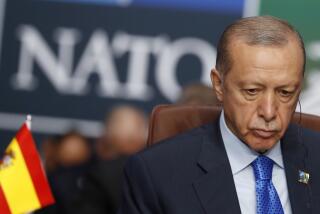Disputed Soviet Region Votes to Join Armenia : Impatient Legislators of Nagorno-Karabakh Resolve to Secede From Azerbaijan Republic
- Share via
MOSCOW — Impatient with the prolonged debate over the future of the disputed region of Nagorno-Karabakh, its local legislature has voted to secede immediately from the southern Soviet republic of Azerbaijan, the Communist Party newspaper Pravda reported Saturday.
The resolution, declaring the region’s unilateral withdrawal from Azerbaijan and its affiliation with neighboring Armenia, is clearly unconstitutional, Pravda said, but it reflects the worsening situation in Nagorno-Karabakh, the focus of five months of ethnic strife in the Caucasus.
The issue is only one of a dozen serious ethnic problems confronting the Soviet leadership as it attempts to broaden and accelerate the political, economic and social reforms of Mikhail S. Gorbachev, the Communist Party’s general secretary.
Although disparate and complex, the issues will be brought together for discussion as the “nationality question” during the party’s special conference, which opens here Tuesday.
While the question is not the major one before the conference, it is an important element in the widening debate--the real focus of the conference--over the future of the Communist Party, its relationship with the Soviet state and with society and the way it should exercise its leadership role.
With the promise of widespread decentralization and greater democracy as part of Gorbachev’s reforms, ethnic tensions have increased substantially within what was the Czarist Russian empire long before it became the Soviet Union, a federation of 15 national republics and more than 100 ethnic groups.
Protests in the Baltic republics of Estonia, Latvia and Lithuania, in the Ukraine and Moldavia, among small minorities such as the Crimean Tatars and the Meskhetians and even in remote parts of Siberia give the Nagorno-Karabakh dispute even greater importance.
The “theses” put to the conference by the party’s Central Committee call for action to resolve ethnic differences. “Inter-ethnic issues shall be settled on the basis of genuine democracy, in the spirit of perestroika, “ the theses said, referring to Gorbachev’s broad reform effort that involves political, economic and social restructuring.
Most delegations from outlying Soviet republics, among them Estonia and Lithuania, have a mandate from the Communist Party members they represent to press for more independence from the central government in Moscow.
More Economic Autonomy
Estonia, for example, wants increased economic autonomy and much greater political independence, and more than 100,000 people gathered in Tallinn last week to see the Estonian delegation off.
In Lithuania, 10,000 people gathered Friday in Vilnius, the capital, to urge their delegation to press for more independence, particularly on issues of national culture, language and history and on environmental protection.
Communist Party officials here have said that they believe the conference will adopt measures that will increase the autonomy of the 15 republics but that “policy coordination remains a serious concern, too,” one senior official said.
In Nagorno-Karabakh, however, the local governing council declared that the region, “without waiting for any decision by the Supreme Soviet (Parliament) of the Soviet Union, is seceding from the Azerbaijan Soviet Socialist Republic,” Pravda reported.
New protests followed the action, Pravda said, and for a time the demonstrators laid siege to the offices of the local party newspaper in Stepanakert when it refused to publish the full text of the government resolution, censoring the decision to secede from Azerbaijan.
If the transfer could not be pushed through immediately, the Nagorno-Karabakh government requested that the Supreme Soviet do it on a temporary basis in order to ease the crisis there.
Troops on Patrol
Troops, sent by the central government to maintain order and prevent further communal clashes, are continuing to patrol Stepanakert and other district towns in the region as well as a number of cities and towns in other parts of Azerbaijan and in Armenia.
A general strike, begun more than a month ago, continues in Nagorno-Karabakh, an enclave of Christian Armenians in Azerbaijan, which is predominantly Muslim and Turkic in origin and speech. Residents say they intend to continue the strike until the central government transfers the region, part of Azerbaijan for 65 years, to Armenian administration.
Pravda, in earlier dispatches, characterized the situation in Nagorno-Karabakh as “out of the control” of local government and party officials.
The conflict, in which 35 people are officially reported to have been killed, pits Armenia and Azerbaijan, two of the 15 national Soviet republics, against one another--without any clear indication of how the central government will resolve the crisis.
Constitutional Conflicts
Armenia supports the Nagorno-Karabakh residents--three-quarters of the 184,000 inhabitants are Armenians--in their demand for “national self-determination” as guaranteed under the Soviet constitution, but Azerbaijan cites another section of the constitution to say that the country’s internal borders are settled and can be changed only with the agreement of all concerned.
Earlier reports from the official news agency Tass and Radio Yerevan in the Armenian capital spoke only of a renewed request to the Supreme Soviet by the regional government for the transfer, which Armenia supports but Azerbaijan opposes.
Foreign correspondents have been barred from the area, as well as the rest of Azerbaijan and Armenia, since February. Reports of developments there are consequently based on official statements and accounts in the Soviet press, telephone calls to local officials and news media in the area and information gathered by political dissidents. Soviet officials said last week that they doubted that foreign reporters would be allowed into the area “for some months yet.”
Soviets admit defense, foreign policy errors. Page 8.
More to Read
Sign up for Essential California
The most important California stories and recommendations in your inbox every morning.
You may occasionally receive promotional content from the Los Angeles Times.










